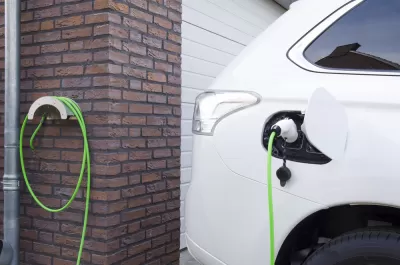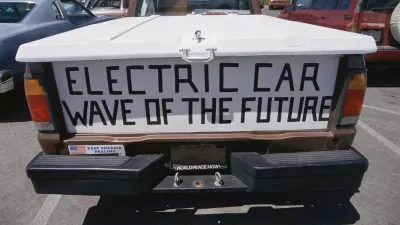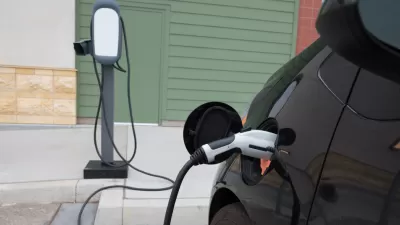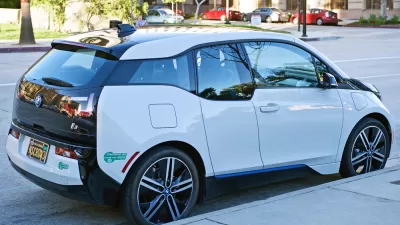Battery electric vehicles (without gas tanks) are eligible for a $2,500 California rebate, on top of the federal $7,500 tax credit. A bill before the state Senate would quadruple it.

[Updated August 29, 2017] California may be the nation's leader in terms of climate mitigation laws and regulations, but it does not look like the state will meet it's new 2030 target that calls for reducing emissions 40 percent by 2030. Two recent studies, one by the California Air Resources Board, the other by the non-profit Next 10, point the finger at the state's auto culture, as emissions are dropping in all other sectors but the largest, transportation.
Notwithstanding a generous financial incentive program and other perks, not enough electric vehicles (EVs) are being purchased by the state's residents, reports Russ Mitchell for the Los Angeles Times.
In 2016, of the just over 2 million cars sold in the state, only 75,000 were pure-electric and plug-in hybrid cars [3.75 percent]. To date, out of 26 million cars and light trucks registered in California, just 315,000 are electric or plug-in hybrids [0.06 percent].
Is the problem that EVs cost too much?
The idea behind Assembly Bill 1184: "Vehicular air pollution, electric vehicles – incentives," by Assemblyman Phil Ting (D-San Francisco), is "to use state rebate money so the consumer needn’t pay more for an electric compact car than a similar gasoline-powered compact car."
That’s the essence of the plan that could lift state rebates from $2,500 to $10,000 or more for a compact electric car, making, for example, a Chevrolet Bolt EV electric car [starting at $37,495] cost the same as a gasoline-driven Honda Civic [starting at $18,740].
That's pretty close. The all-electric Bolt is also eligible (for the time-being) a $7,500 federal Plug-In Electric Drive Vehicle Credit, bringing the cost down to $19,995.
The budget for such a program would be $3 billion, up from the $449 million the state has spent over seven years that the rebate program has existed, and that has created concerns for legislators and state legislative analysts, adds Mitchell.
The bill is opposed by Republicans averse to taxpayer subsidies and even the Legislature’s own analysts have called it “duplicative,” “unclear” and “problematic.
The legislative analysis goes into depth on the source of the funds, the Greenhouse Gas Reduction Fund, consisting of proceeds from the cap-and-trade auction of carbon permits. Last month, legislation to continue cap-and-trade beyond 2020 passed the legislature and was signed by Gov. Jerry Brown.
Or is the problem a lack of charging infrastructure?
A University of California study, also released last month, concluded the major obstacle to widespread adoption of EVs was a lack of charging infrastructure, the topic of a July 6 post: "Charging Anxiety, Not Price Anxiety, the Biggest Impediment to Electric Vehicle Adoption."
AB 1184 is co-sponsored by Advanced Energy Economy, a national association of business leaders working on clean energy, and NextGen America, founded by business leader, philanthropist and political and environmental activist, Tom Steyer.
The bill has passed the Assembly and is before the Senate Appropriations Committee. It needs to pass the legislature by Sept. 15 and be approved by Gov. Jerry Brown to become law.
Hat tip to Julie Bloom, editor of California Today (New York Times).
FULL STORY: Should California spend $3 billion to help people buy electric cars?

Alabama: Trump Terminates Settlements for Black Communities Harmed By Raw Sewage
Trump deemed the landmark civil rights agreement “illegal DEI and environmental justice policy.”

Study: Maui’s Plan to Convert Vacation Rentals to Long-Term Housing Could Cause Nearly $1 Billion Economic Loss
The plan would reduce visitor accommodation by 25% resulting in 1,900 jobs lost.

Planetizen Federal Action Tracker
A weekly monitor of how Trump’s orders and actions are impacting planners and planning in America.

Waymo Gets Permission to Map SF’s Market Street
If allowed to operate on the traffic-restricted street, Waymo’s autonomous taxis would have a leg up over ride-hailing competitors — and counter the city’s efforts to grow bike and pedestrian on the thoroughfare.

Parklet Symposium Highlights the Success of Shared Spaces
Parklets got a boost during the Covid-19 pandemic, when the concept was translated to outdoor dining programs that offered restaurants a lifeline during the shutdown.

Federal Homelessness Agency Places Entire Staff on Leave
The U.S. Interagency Council on Homelessness is the only federal agency dedicated to preventing and ending homelessness.
Urban Design for Planners 1: Software Tools
This six-course series explores essential urban design concepts using open source software and equips planners with the tools they need to participate fully in the urban design process.
Planning for Universal Design
Learn the tools for implementing Universal Design in planning regulations.
Caltrans
Smith Gee Studio
Institute for Housing and Urban Development Studies (IHS)
City of Grandview
Harvard GSD Executive Education
Toledo-Lucas County Plan Commissions
Salt Lake City
NYU Wagner Graduate School of Public Service





























